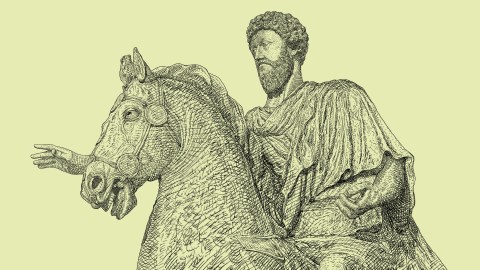Marcus Aurelius’ son was a murderous psychopath. Is Stoicism to blame?

- Roman Emperor Marcus Aurelius was the famous Stoic philosopher king who wrote Meditations as a personal philosophical journal that wasn’t intended for publication.
- Known as the last of the five “good emperors,” Marcus Aurelius had a son named Commodus who earned a reputation as a psychopathic and narcissist party animal — the opposite of his father.
- Did Commodus’ downfall stem from Marcus Aurelius being a hypocrite to Stoicism, in that he neglected his fatherly duties? Or did Marcus use Stoicism to cope with his understanding of Commodus’ impending and unfixable doom?
Marcus Aurelius was a Stoic philosopher and Emperor of the Roman Empire from 161 to 180 AD. Not only is he revered for his book Meditations, which is full of wisdom lauded by generations of state leaders and academics, but he was also the last of the five “good emperors” under which Rome peaked in its sense of political and societal cohesiveness.
Being a “good emperor” essentially meant disguising “the absoluteness with which the emperor ruled: to preserve a façade — and sometimes, no doubt, even to achieve the reality — of consensus and cooperation,” as noted by English translator of Meditations and University of Virginia Classics professor Gregory Hays.
In other words, the period in the Roman Empire marked by rule under “good emperors” was nothing but a reputational matter. So much death and violence occurred during this nearly 100-year period (96 AD to 180 AD) in Rome — destruction that can in no sense be called “cooperative” or “flourishing” apart from this “sense of political and societal cohesiveness.”
Nevertheless, Marcus’ reputation as a good emperor and a critical philosopher was earned. Under his reign, like all Emperors, his primary duties were legislative and administrative. Still, historians like Herodian note his idiosyncratic conscientiousness and attention to theoretical rigor in these matters compared to his predecessors. And as we’ll see, his reign was marked by a plague and two wars he navigated with relative success.
Commodus, Marcus Aurelius’ son: the anti-Stoic
The philosopher king reverted the Empire to an old Roman Republic practice of two co-emperors ruling Rome. This reversion occurred on two occasions. The first was with his half-brother, Lucius Verus, who died from the plague in 169 AD, and the second was with his biological son, Commodus, in 176 AD when he was only 19 years old.
Commodus was Marcus’ reputational opposite; unfortunately, he also earned his reputation. The historical consensus is that Commodus was a reckless party animal, narcissist, and psychopath. Assuming senior emperorship upon Marcus’ death in 180 AD, Commodus exited the throne in characteristic fashion — by being assassinated in one of the many notorious gladiator fights he put on for (mainly his own) entertainment.
In other words, Commodus was the anti-Stoic: no care for today nor tomorrow; lazy; undutiful; lustful; vengeful; and masturbatory — everything Marcus advises against in his Meditations.
Given Marcus Aurelius’ reputation, one might wonder whether Stoicism may have played a role in Commodus’ erratic behavior and inability to lead Rome. This much has at least been suggested as a worthwhile question, perhaps most recently by Daily Stoic host Ryan Holiday.
What role did Marcus Aurelius play in Commodus’ anti-Stoicism?
There are, of course, historical explanations for Marcus’ antithesis successor. For example, Marcus’ total absence as a father in Commodus’ life until his teenage years could aid in a contemporary psychological explanation of Commodus’ misbehavior. Neither a team of skilled nurses, teachers, aids, and trainers, nor lavish material inheritance, can replace a father.
Marcus, by contrast, had several father figures in succession throughout his life. First in his father, who died when he was three; then, his grandfather Marcus Annius Verus, his maternal great-grandfather Lucius Catilius Severus, and finally, his adoptive father, Emperor Antonius Pius. The contrast between the Stoic and anti-Stoic is the former’s fatherly guidance and the latter’s lack of it.
However, the causes of poor character can’t be reduced to the lack of a father figure. Other perspectives exist, such as the Stoic perspective, which can be applied in several ways regarding the relationship between Marcus Aurelius and Commodus.
Was Marcus’ fatherly absenteeism a hypocritical departure from his philosophical ideals or an enactment of them? In some sense, the answer is both. On one hand, Marcus neglecting his fatherly duties was a necessary sacrifice to be a “good emperor.” On the other hand, Marcus arguably should have known his actions risked setting Commodus on an ill-fated path.
A Stoic sense of duty
Roman Stoicism emphasizes cultivating a personal sense of duty. One must make clear to themselves their responsibilities in order not to evade them. But Stoicism is also marked by an intense level of harshness –especially toward oneself as a defense mechanism against extreme external misfortune. “The Stoic,” says Nietzsche in The Gay Science:
“…trains himself to swallow stones and worms, slivers of glass and scorpions without nausea; he wants his stomach to become ultimately indifferent to whatever the accidents of existence might pour into it… For those whom fate attempts improvisations –those who live in violent ages [dependent] on sudden and [volatile] people—Stoicism may indeed be advisable.”
Stoicism got its association with emotional detachment for a good reason. The idea is to create a complete duality between the “internal” world of the mind and the “external” world, and to ensure that the former doesn’t disrupt you from performing the necessary tasks and social obligations of daily life. It is to turn off from the world to the extent of functioning efficiently in one’s practical responsibilities and social duties, but no more.
This is not Epicureanism (in which “ataraxia,” or freedom from pain, is valued). It is Stoicism.
Pleasure is not highly valued by the Stoics. Seriousness, civility, and inner fortitude in the face of tragedy, along with resisting the temptation to succumb to passions of excess and attachment through our rationality, is instead the essence of Stoicism. If something hurts, you deal with it — viewing the problem as something necessary and uncontrollable. In this sense, the Stoics adhere to amor fati (i.e., love or acceptance of fate/necessity).
The main idea is to embrace what cannot be changed — especially if closing off to it or trying to fix it deeply pains you.
Meditations as a personal philosophical therapy
Unlike Commodus’ reign as emperor, Marcus Aurelius’ was plagued — literally and figuratively. The Antonine Plague broke out and killed millions during his reign, and war was ever-present. “Soon after [Marcus’] accession, relations between Rome and its only rival, the Parthian Empire in the East, took a dramatic turn for the worse.”
English translator of the Meditations and University of Virginia Classics professor Gregory Hays analogizes this event with the Cold War. Imagine if, in an alternative world without modern weaponry, the Cold War turned hot. (It was this level of political and legislative anxiety that Marcus was responsible for making better.)
That’s not the only extreme source of stress Marcus was under as emperor. Germanic tribes of Eastern Europe conducting violent raids in the north of Rome by Gaul, whom Marcus eventually pushed back with success, was another war that occupied much of his mental space. Furthermore, his half-brother and mother died of the plague, and seven of his children had died before ever reaching adulthood. And the only son that didn’t die was the disappointment that succeeded him!
Marcus needed Stoicism, as Nietzsche’s advisability of it only in violent and dire circumstances helps us to understand. Indeed, according to Roman historian Cassius Dio, Marcus’ strong resolve through such calamities — rather than the Epicurean avoidance of such pains — may eventually have caused his body to weaken to the point of early demise.
Marcus knew Commodus was “simplistic,” having inherited “many guardians, among whom were numbered the best men of the senate. But [this] Commodus rejected and after making a truce with the [Germanic tribes] he rushed to Rome, for he hated all exertion and craved the comfortable life of the city.”
But while Marcus was aware of Commodus’ “simplicity,” he was unaware of his psychopathy and narcissism, for Dio also suggests that Marcus may have been killed by a physician doing a favor for Commodus. Historians from Rome until now unanimously regard Commodus as a mass murderer and a narcissist, so it’s not an implausible theory.
Did Stoicism provide therapeutic benefits for Marcus, helping him find solace amid the pain of realizing the moral shortcomings of his son? Perhaps. Marcus had duties he knew to be impactful as emperor and could not let the tragedies of his personal life compound those of his Aristocratic and bureaucratic life, which were already extreme enough.
Amor fati
The first principle of Stoicism is that the universe and its order are rational and deterministic, so freedom is voluntarily accommodating ourselves to the inevitable. Amor fati is the resolve to see the world in this way at all times, even regarding “small” things, such as anything that erupts negative emotions in us. If everything is a matter of impersonal necessity — the central Stoic metaphysical view — then tragedies are just as necessary as serendipity, and both warrant the same emotionally neutral response.
Nietzsche’s point was that this “ideal” Stoic is inwardly tumultuous but outwardly civil and noble; inwardly suffering but outwardly proud and praised. And perhaps the notion here of Stoic “happiness” — as Marcus called it — is what roots Commodus’ downfall. Given that Marcus knew Commodus was a disappointment, he had to swallow his pride to continue being emperor. And there is no doubt that this inner turmoil contributed to Marcus’ physical deterioration in his fifties, which would surely have hastened without the therapeutics of philosophy, which for Marcus, was explicitly personal.
Marcus, therefore, avoided one set of duties for another because one set (Commodus) was, to his eye, doomed to ill-fate, while the other (the Roman Empire) was not. The Stoic is simply against what is vain and petty, which was the essence of Commodus. It is thus doubtful that Marcus’ personal philosophy against vanity and pettiness was the sole cause of his son’s lowly essence. What is doomed cannot be one’s duty. As Nietzsche said, “Some men are born posthumously.”





